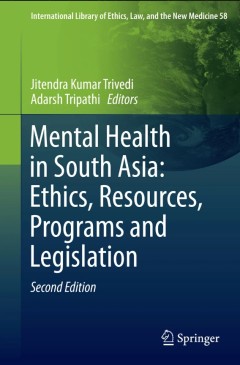Filter by

Ethics, Economics and Social Institutions
The book highlights the ethical aspects and issues that are inherent to economics in the context of today’s prominent social institutions. It reviews a range of problems concerning dominant social institutions, namely markets, government agencies, corporate entities, financial networks, and religious systems. Further, in each case, the book takes a detailed look at the economic problems as th…
- Edition
- -
- ISBN/ISSN
- 978-981-10-0899-3
- Collation
- 4 illustrations in colour
- Series Title
- -
- Call Number
- -

Ethics and the Archaeology of Violence
This volume examines the distinctive and highly problematic ethical questions surrounding conflict archaeology. By bringing together sophisticated analyses and pertinent case studies from around the world it aims to address the problems facing archaeologists working in areas of violent conflict, past and present. Of all the contentious issues within archaeology and heritage, the study of confli…
- Edition
- -
- ISBN/ISSN
- 978-1-4939-1643-6
- Collation
- 2 b/w illustrations, 13 illustrations in colour
- Series Title
- -
- Call Number
- -

Ethics and Archaeological Praxis
Restoring the historicity and plurality of archaeological ethics is a task to which this book is devoted; its emphasis on praxis mends the historical condition of ethics. In doing so, it shows that nowadays a multicultural (sometimes also called “public”) ethic looms large in the discipline. By engaging communities “differently,” archaeology has explicitly adopted an ethical outlook, pu…
- Edition
- -
- ISBN/ISSN
- 978-1-4939-1646-7
- Collation
- 4 b/w illustrations, 6 illustrations in colour
- Series Title
- -
- Call Number
- -

Ethical Engineering for International Development and Environmental Sustainab…
Ensuring that their work has a positive influence on society is a responsibility and a privilege for engineers, but also a considerable challenge. This book addresses the ways in which engineers meet this challenge, working from the assumption that for a project to be truly ethical both the undertaking itself and its implementation must be ethically sound. The contributors discuss varied to…
- Edition
- -
- ISBN/ISSN
- 978-1-4471-6618-4
- Collation
- 28 b/w illustrations, 12 illustrations in colour
- Series Title
- -
- Call Number
- -

Ethical Counselling and Medical Decision-Making in the Era of Personalised Me…
This book offers an overview of the main questions arising when biomedical decision-making intersects ethical decision-making. It reports on two ethical decision-making methodologies, one addressing the patients, the other physicians. It shows how patients’ autonomous choices can be empowered by increasing awareness of ethical deliberation, and at the same time it supports healthcare professi…
- Edition
- -
- ISBN/ISSN
- 978-3-319-27690-8
- Collation
- 4 illustrations in colour
- Series Title
- -
- Call Number
- -

Engineering Identities, Epistemologies and Values Engineering Education and …
This second companion volume on engineering studies considers engineering practice including contextual analyses of engineering identity, epistemologies and values. Key overlapping questions examine such issues as an engineering identity, engineering self-understandings enacted in the professional world, distinctive characters of engineering knowledge and how engineering science and engineering…
- Edition
- -
- ISBN/ISSN
- 978-3-319-16172-3
- Collation
- 18 b/w illustrations
- Series Title
- -
- Call Number
- -

Neuroenhancement: how mental training and meditation can promote epistemic vi…
This book explores how one can bring about changes in the brain through meditation, both through attention-focus training and through compassion training. Recent findings in the natural sciences have confirmed that it is possible for humans to achieve these structural and functional changes through various life-style practices. It is argued that meditation enables us to influence some aspects o…
- Edition
- 1
- ISBN/ISSN
- 978-3-319-23516-5
- Collation
- XI, 110
- Series Title
- SpringerBriefs in Ethics
- Call Number
- -

Nanotechnology and Ethical Governance in the European Union and China
This book addresses questions surrounding the feasibility of a global approach to ethical governance of science and technology. The emergence and rapid spread of nanotechnology offers a test case for how the world might act when confronted with a technology that could transform the global economy and provide solutions to issues such as pollution, while potentially creating new environmental and…
- Edition
- 1
- ISBN/ISSN
- 978-3-319-18232-2
- Collation
- XII, 227
- Series Title
- -
- Call Number
- -

Migration in the Age of Genocide
This book presents a novel proposal for establishing justice and social harmony in the aftermath of genocide. It argues that justice should be determined by the victims of genocide rather than a detached legal system, since such a form of justice is more consistent with a socially grounded ethics, with a democracy that privileges citizen decision-making, and with human rights. The book covers …
- Edition
- 1
- ISBN/ISSN
- 978-3-319-21848-9
- Collation
- XIV, 216
- Series Title
- Migration, Minorities and Modernity
- Call Number
- -

Mental Health in South Asia: Ethics, Resources, Programs and Legislation
Asia is by far the largest continent in the world in terms of area with population exceeding 3.5 billion and has dozens of cultures, religions, languages and ethnic groups. As a result of its highly varied political systems, Asia also spawns a wide variety of health care systems including mental health care systems, often based on historical roots and at times colonial heritages. The people who…
- Edition
- 1
- ISBN/ISSN
- 978-94-017-9016-1
- Collation
- XV, 363
- Series Title
- International Library of Ethics, Law, and the New Medicine
- Call Number
- -
 Computer Science, Information & General Works
Computer Science, Information & General Works  Philosophy & Psychology
Philosophy & Psychology  Religion
Religion  Social Sciences
Social Sciences  Language
Language  Pure Science
Pure Science  Applied Sciences
Applied Sciences  Art & Recreation
Art & Recreation  Literature
Literature  History & Geography
History & Geography